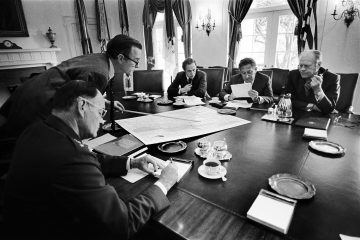 Dan Bessner in The New Republic:
Dan Bessner in The New Republic:
[I]n the NSC’s first years of existence, President Harry Truman “mostly avoided” its meetings. It was only after the Korean War’s outbreak in June 1950 that the NSC began to emerge as a major player in U.S. foreign policymaking. The conflict, which militarized and globalized the Cold War, convinced the president that he needed to use the NSC to better harmonize his ever-more-complex foreign policy. Truman started to chair more NSC meetings; ensured the council met at least once a week; and, most importantly, “demanded that his decisions on Korea and other issues be channeled through—and coordinated by” the NSC. Truman thus initiated a trend toward centralization of foreign policymaking in the White House that would increasingly characterize American decision-making.
President John F. Kennedy further concentrated power around his person. At the recommendation of Richard Neustadt, a Columbia University political scientist who specialized in the American presidency, Kennedy made “NSC staffers not servants of the larger National Security Council but instead a ‘tight group of very able general utility assistants’ to the president himself.” Kennedy, in the words of one State Department official, essentially established a “foreign office in microcosm” headquartered in the White House. Unfortunately, it turned out that empowered NSCs staffers were not always particularly wise. To take just one example, it was an NSC staffer who convinced Kennedy to support the 1963 coup against Ngô Đình Diệm, the president of South Vietnam, which set the stage for deeper American involvement in the Vietnamese civil war.
More here.
